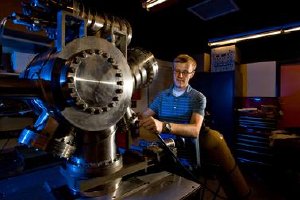Feb 8 2010
Dirty fingernails have given way to wearing gloves for Michael Christiansen, who has followed his passion for science from fossil-hunting in the field to growing nanocrystals in a research lab.
 Michael Christiansen, an ASU sophomore, moves a slow stream of helium gas around the joints and seals of a vacuum chamber to check for leaks. A sensor in the chamber detects the presence of the helium and records it on an attached computer. Tom Story photo.
Michael Christiansen, an ASU sophomore, moves a slow stream of helium gas around the joints and seals of a vacuum chamber to check for leaks. A sensor in the chamber detects the presence of the helium and records it on an attached computer. Tom Story photo.
At 20, the ASU sophomore in physics is funded by ASU’s NASA Space Grant program to help build an ultrahigh vacuum chamber for experiments on the growth of silicon and germanium nanowires. He spends hours every week in the physics lab of Jeff Drucker, a professor in the College of Liberal Arts and Sciences.
As a child he collected rocks, minerals, fossils and ancient Roman coins, and he spent time venturing into Colorado’s wilderness areas near his home in Lakewood. He was an Eagle Scout, hiking up 14,000-foot peaks, camping in Colorado’s winter snow.
His affinity for science is related to his fascination with nature, Christiansen says. But he wasn’t sure which branch of science he’d pursue until he took an honors section of a freshman physics course at ASU.
“More than any single mind-blowing idea, that class gave me a taste for the ‘flavor’ of physics as a means of examining and describing nature,” he says. “It was the kind of impression that has more to do with the way something feels than what it specifically is.
“I came to ASU with a broad interest in science, knowing that there was a lot of interesting scientific research happening in a wide variety of disciplines here, and that I could probably find a way to work in a lab as an undergraduate. It was good to know I had flexibility in choosing a major.”
He spent the summer of 2007 collecting Eocene-aged mammalian fossils from the Wind River Basin of Wyoming, as part of a paleontology internship for the Denver Museum of Nature and Science. While he has returned to the field every summer since, it was that first experience which cemented his decision to make a career in science.
Arguably the most amazing experience he’s had at ASU was not in the lab or the field, however. It was his first trip outside the United States last summer with fellow students in Barrett, the Honors College. They toured factories in China where iPhone batteries and treadmills were being made, while learning about globalization.
Christiansen still finds time to go hiking and skiing, and he volunteers at informal science education events. He also writes poetry, and one of his poems was published last year in the ASU undergraduate creative review, Lux.
His poetic talent is evident in his description of that summer collecting fossils in Wyoming:
“It was invigorating to think that all around me the lonely expanses of striped Wyoming badlands concealed data buried beneath dirt and rock, and we could merely scratch the surface. At night we spread out the day’s specimens under the light of a lantern, got excited about the significant finds and talked about science. For the first time I had the sensation of being able to touch physically the progress of knowledge.”